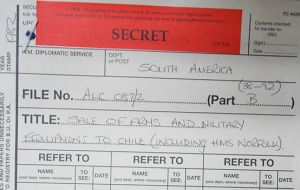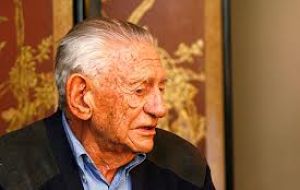MercoPress. South Atlantic News Agency
Pinochet generals and ministers incognito and “non official” visits to UK
 Sale of arms and military equipment to Chile (HMS Norfolk)
Sale of arms and military equipment to Chile (HMS Norfolk)  General Matthei thirty years ago went shopping in London for books (and spares for the Hawker Hunters)
General Matthei thirty years ago went shopping in London for books (and spares for the Hawker Hunters) The fluid relation between Pinochet’s regime in Chile and the UK following Margaret Thatcher’s victory in 1979 is not nothing new, however declassified British documents of the time to which BBC World had access, reveal the intensity of those links in defence and political issues, including in March/April 1982 when the Argentine military invasion of the Falkland Islands.
“This is a private visit, as a civilian, to buy a few books at Foyles and visit some friends in London from the time I was Air Force attaché” said in February 1982 General Fernando Matthei, commander of the Chilean Air Force and member of the military Junta.
However Matthei also mentioned, besides his ‘official’ visit that he expected to meet with Ministry of Defence officials to talk about the coming maintenance and upkeep of the Hunter fighters. But this was top secret: no word about it was to be mentioned. (Hawker Hunters were used by the Chilean Air Force to bomb the presidential palace in September 1973 when the coup)
The only ones aware of Matthei’s real mission in London were the Ministry of Defence and the Foreign Office which had received a confidential report anticipating the visit from the British ambassador in Santiago, as recorded in a recently declassified report from the UK government.
In 1980 and a few months after taking office PM Margaret Thatcher lifted the arms blockade on Chile which had been effective since the beginning of the Pinochet regime.
“The arrival of Thatcher to office marked a fundamental change in relations between Chile and the UK”, explains Uruguayan born Professor Francisco Panizza who currently teaches at the London School of Economics and is an expert in Latinamerican affairs.
Although officially the government of PM Thatcher tried a low profile for its good relations with the regime of General Pinochet, not only did they exist and flourish but resulted in several business deals.
Since the lifting of the embargo in 1980 to the end of April 1982, Chile had purchased in the UK arms and equipment for £ 21 million, which would be equivalent nowadays to £ 110 million or 160 million dollars. This included vessels, aircraft, guns and communication equipments among other items, but transactions were kept in the utmost reserve.
But yes they remained recorded in the secret archives some of them now declassified and to which the BBC World had access.
One of the vessels that left the UK at the end of March was turned back in support of the Falklands conflict which broke out two weeks after the vessel took to sea.
The sale of the second vessel took place 6 April four days after the landing of Argentine troops in the Falklands. (HMS Norfolk later “Capitan Prat” )
“The conflict helped to consolidate certain affinities and common interests, which were evident between both countries’ governments”, added Panizza.
Chile was the leading strategic ally of the UK in the recovery of the South Atlantic Islands and Matthei was one of the main interlocutors.
“I decided to talk to the English but they took the initiative. At that time a Commander Sidney Edwards arrived in Chile and we negotiated the delivery of aircraft, anti aircraft missiles, and radars in exchange for information. (…) We supported them with constant monitoring, radar and electronic listening devices” revealed Matthei in an interview back in 2005.
But what he did not say was that discussions had been going on for a long time, as the declassified documents show.
A month and a half before the war between Argentina and UK broke out, the Chilean embassy informed the Foreign Office details of Matthei’s visit: flight number, hotel booking and the time he planed to spend in London, from February 21 to 26.
“As a member of the Junta in Chile, General Maitthei is a very controversial figure. Despite his visit is not official we can’t be sure it doesn’t become public. If that happens any meeting with top officials from the cabinet will no doubt be strongly criticized by the human rights groupings”, warns a confidential memo from the Foreign Office in 1982.
Instructions were straight and clear: no secretary, minister or high ranking officer from government could participate in social activities or meetings with Matthei.
“However, the participation of second ranking officers from the Ministry of Defence or high ranking military officers to discuss defence sales must not be objected”, cautioned the memo.
“The British government has always been quite reluctant to mix economic with political relations. What matters are interests not ideologies” Panizza told BBC.
However Matthei was not the first Chilean official to visit incognito the UK.
“The position is similar to that of past visits to London by General Cesar Benavides, former Defence minister and now member of the Junta (1981/1983), and I believe that of Admiral (Jose) Merino who also was in London, which I think took place before I took my post”, concluded the confidential report from the British ambassador in Chile to the Foreign Office.
That means, Matthei was at least the third member of the Military Junta to have visited the UK as active member of the Chilean de facto government led by General Pinochet. But the truth is that the record on Pinochet regime top officials visits goes back quite a bit.
In effect by July 1977, under Labour PM James Callaghan, four ministers from the Pinochet regime had been in the UK on ‘private visits’ according to a Foreign Office restricted document from the time.
Sergio Fernandez, Labour minister spent two days in mid February. Foreign Affairs minister Admiral Patricio Carvajal visited London from March 3 to 8 on his return from a meeting in Geneva.
Another cabinet member who stopped by at London after a conference in Paris was Mining minister Enrique Valenzuela. At the time the English capital was no calling point for any commercial or private flight link to Chile.
But the most controversial of all visits was that of Finance minister Sergio Castro, who was in London from 29 June to 3 July, in search of investors interested in putting their money in a buoyant and neo-liberal country in the end of the world, called Chile.
In the midst of the economic crisis, Castro visited Bonn, Paris, Brussels and London where he met with top CEOs from the banking system and private industry. Even Canning House which is responsible for promoting and strengthening relations between the UK and the Spanish speaking world hosted Castro with a lunch to his honour. “A private” visit but not official, as the Foreign Office would be quick to reply to any questions on the subject.
Also in secret the UK hosted visits of Agriculture and Economy ministers from the Pinochet regime.




Top Comments
Disclaimer & comment rules-

-

-

Read all comments“In secret”. Only criminals need to do things in secret.
Feb 21st, 2013 - 12:32 am 0Pinochet was great for Chile it is too bad Argentina just had thugs that kept the status quo in place instead.
Feb 21st, 2013 - 12:46 am 0Argentina might doing as well as Chile with different Dictators.
@1 - so “Secret Santa” is actually a criminal act? I never knew that for sure, but I always suspected there was something odd about it. Now I know.
Feb 21st, 2013 - 01:06 am 0Commenting for this story is now closed.
If you have a Facebook account, become a fan and comment on our Facebook Page!